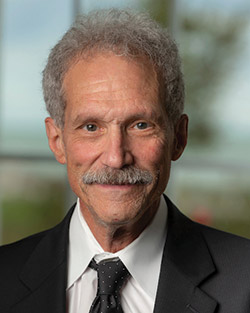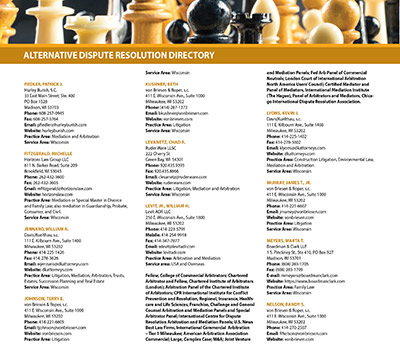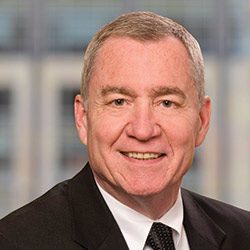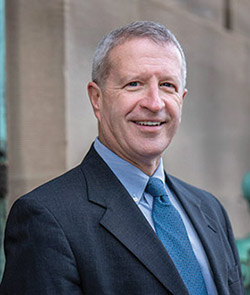Kohner, Mann & Kailas brings final chapter of antitrust lawsuit back to Wisconsin
By: Michaela Paukner, [email protected]//November 25, 2019//
Kohner, Mann & Kailas brings final chapter of antitrust lawsuit back to Wisconsin
By: Michaela Paukner, [email protected]//November 25, 2019//
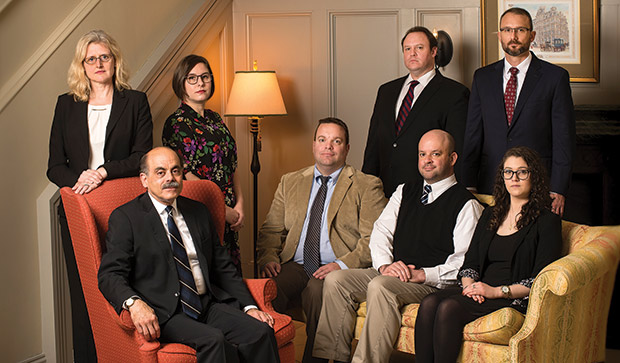
Bob Gegios of Kohner, Mann & Kailas compares a massive natural gas antitrust lawsuit he’s been working on for years to the “Odyssey.” The case — about to enter its 13th year of litigation — is a class-action suit against energy companies accused of fixing the price of natural gas. The inflated prices cost Wisconsin industrial and commercial purchasers hundreds of millions of dollars collectively.
Like the hero in the Homeric epic, the case has conquered crucial tests, including winning a favorable ruling from the U.S. Supreme Court; wandered for years — bouncing from state to federal courts and back; and returned home to Wisconsin — the latest chapter in its lengthy legal history.
Bouncing Between Courts
The antitrust case involves deregulated gas sold to commercial and industrial businesses in Wisconsin. These businesses depend on national price indexes to gauge the fair cost of gas. The lawsuit alleges the energy companies colluded to double retail gas prices between 2000 and 2002, violating Wisconsin’s antitrust laws and costing purchasers millions of dollars.
From 2006 to 2009, seven Wisconsin plaintiffs filed lawsuits in state courts and the Western District. Wauwatosa-based Briggs & Stratton Corp, Kenosha-based Carthage College, Middleton-based Merrick’s Inc., Menomonee Falls-based Arandell Corp., Plymouth-based Sargento Foods Inc., Wisconsin-based Ladish Co. Inc. and Wisconsin-based Newpage Wisconsin System Inc. were named in the class action against nearly a dozen energy groups.
The defendants removed the state lawsuits to federal district court in Madison and then moved them to a federal multidistrict litigation court in Las Vegas, where they were consolidated with similar lawsuits from California, Wyoming, Kansas, Missouri and Colorado. The defendants in the suit argued the Natural Gas Act took precedence over state antitrust laws, and the federal district courts reconsidered a contrary ruling and ruled in their favor in 2011, awarding them summary judgment.
The 9th Circuit reversed the decision in 2013, noting the alleged price manipulation affected wholesale and retail sales. The defendants then asked the U.S. Supreme Court to decide if the federal Natural Gas Act trumped state laws. In 2015, the high court sided with the 9th Circuit, allowing the case to proceed.
“The free-market system for setting interstate pipeline rates turned out to be less than perfect,” Gegios reads from the Supreme Court opinion with visible satisfaction.
The opinion continues, stating “As we have repeatedly stressed, the Natural Gas Act ‘was drawn with meticulous regard for the continued exercise of state power, not to handicap or dilute it in any way.’”
The energy companies started to reach settlements after the Supreme Court ruling. The Wisconsin plaintiffs received more than $20 million when the first four energy groups settled and nearly $20 million from the second settlement with two other groups.
The Nevada court broke up the consolidated cases earlier this year, sending Wisconsin’s class action back to the badger state for trial. Four energy groups — Michigan-based CMS, Texas-based Dynegy, Oklahoma-based Williams and Minnesota-based Xcel Energy — will have the choice to settle or face a Wisconsin jury. Gegios and his team have filed a motion for trial, and they’re hoping for the Madison court to set a date as soon as possible.
“We’re still standing to fight,” said Gegios.

Trials & Travels
Staying in the fight demanded time and determination from KMK. The firm has logged 40,000 hours of attorney time on the case from 2006 to 2018. Gegios himself has logged 11,000 hours — a solid year and three months. The parties filed millions of pages of documents over the past 13 years, and the defendants filed 36 dispositive motions, attacking what Gegios calls the “quintessential case.”
“They ultimately lost every single one,” said Gegios.
When the case was consolidated in Nevada, Gegios found himself frequently traveling between Milwaukee and Las Vegas, often trading sleep and time with family for red-eye flights. He can describe the federal courthouse and recalls the time his taxi driver illegally parked while dropping him off, taking off with Gegios’ briefcase of documents before anyone could stop him. Gegios fortunately didn’t need the documents that day and later recovered the briefcase at his hotel — a small victory.
The big battles KMK has won — namely the favorable ruling from the U.S. Supreme Court and the settlements totaling and already more than $50 million — may eventually lead to the big victory the firm has long sought. The class action distributes the settlement money according to how much natural gas each plaintiff and class member purchased. The State of Wisconsin received $1.2 million in the first settlement and Milwaukee Public School District received $350,000, even though they weren’t named in the lawsuit.
Distributions in the second settlement are still being calculated. The firm is sifting through claims from potential class members through the spring. Gegios said it’s gratifying to see so many Wisconsin institutions benefit from the settlements.
“Winning actually has some meaning,” said Gegios. “It helps Wisconsin.”
The Homecoming
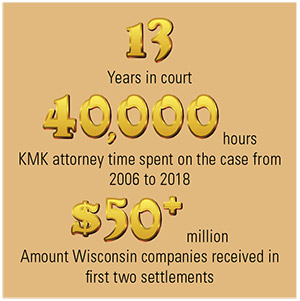 Gegios has watched his counterparts, the courts and his life change as the case has progressed. His children have grown up and graduated since he first filed the case. He’s seen attorneys for the energy companies come and go. Some retired or left their companies, he said, as soon as settlements were reached. He doesn’t think anyone has died in the time it’s taken the case to proceed, and he hopes no one does before it ends.
Gegios has watched his counterparts, the courts and his life change as the case has progressed. His children have grown up and graduated since he first filed the case. He’s seen attorneys for the energy companies come and go. Some retired or left their companies, he said, as soon as settlements were reached. He doesn’t think anyone has died in the time it’s taken the case to proceed, and he hopes no one does before it ends.
The last chapter of the case could be just a year away. The current consolidated class action seeks recovery of the almost hundreds of millions of dollars class members paid. Companies could receive treble damages, which are three times the overcharged amount plus attorney fees, or get back money paid for natural gas — whatever amount is higher. The four remaining energy companies could settle in the coming months, but Gegios and his team will prepare for trial in the meantime.
The attorneys representing the energy companies named in the class action did not respond to requests for comment.
John Skilton and Chris Hanewicz of Perkins Coie in Madison have meanwhile signed on as co-counsel for the plaintiffs. They said they’re eager to tell the story to a Wisconsin jury.
“These are Wisconsin companies and Wisconsin people who have been harmed by this directly,” said Hanewicz. “Our clients are entitled to their day in court for what happened to them here in Wisconsin.”
Gegios is also satisfied that justice will be meted out in front of clients’ fellow Wisconsinites, rather than in a court thousands of miles away. It’s another win here for clients who Gegios said have been dedicated and actively involved throughout the entire case.
“They’re looking out for Wisconsin,” Gegios said.
The case promises to benefit companies beyond those that are directly involved in it.
“It’s an important case as a matter of protecting Wisconsin corporations against anti-competitive practices,” said Skilton. “If we’re right, and we think we are, this will serve other companies well in the future.”
Legal News
- Wisconsin DNR agrees to repeal anti-firearm rule
- Harris kicks off campaign for president with a rally in Wisconsin
- Wisconsin leads 26 governors to strengthen state and tribal child support enforcement act
- Wisconsin man charged with fleeing to Ireland to avoid prison term for Capitol riot role
- Wisconsin Supreme Court reveals September oral arguments calendar
- New Jersey man sentenced for series of violent assaults on members of the Orthodox Jewish Community
- Milwaukee County District Attorney, UWM police address Jewish threats
- With GOP convention over, Milwaukee weighs the benefits of hosting political rivals
- Secret Service head resigns as Congress formally investigates
- Milwaukee Police Department issues statement regarding video release policy
- GOP convention sets the stage for the Democratic convention in Chicago, activists and police say
- Survey: Harris has enough delegates to be nominee
Case Digests
- Ineffective Assistance of Counsel; Double Jeopardy; Sentencing
- Ineffective Assistance of Counsel; Sexual Assault-Prosecutorial Misconduct
- Contract-Negligence
- Criminal Law; Juvenile Law; Discovery
- Family Law; Child Support; Property Division First paragraph(s)
- Ineffective Assistance of Counsel- Exclusion of Evidence of Witness Bias
- Postconviction Relief-Sentencing-Ineffective Assistance of Counsel
- 14th Amendment – Due Process
- Criminal-Sentencing Guidelines – Enhancement
- Bankruptcy-Tax
- Civil Rights – 14th Amendment-Jury Instructions
- Contract; Foreclosure and Property





